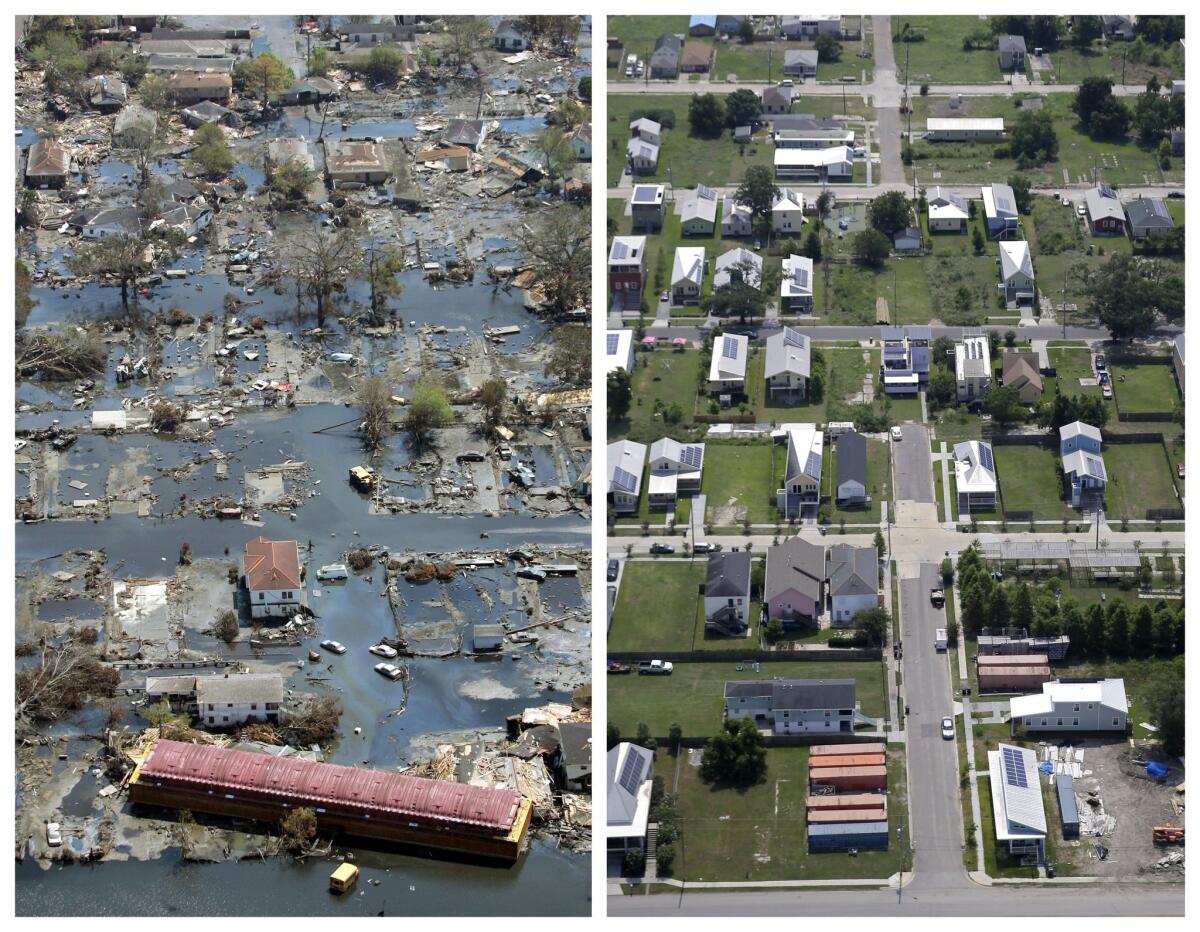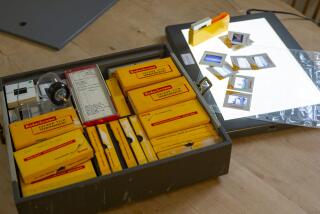Op-Ed: It’s the 10th anniversary of Katrina, and I don’t know how to feel

This combination of Sept. 11, 2005 and July 29, 2015 aerial photos show the Lower Ninth Ward of New Orleans flooded by Hurricane Katrina and the same area a decade later.
Last month, my mother mentioned that she would be out of town on the 10th anniversary of Hurricane Katrina. When my sister admonished her to stay home, my mother replied, “Why? I wasn’t here when it hit.”
I share my mother’s ambivalence. For weeks, I’ve been overwhelmed by the sheer quantity of commemorative events. In addition to dozens of Katrina-related articles, my inbox has been filling with invitations to Katrina conferences, Katrina art exhibits, Katrina poetry readings, Katrina book signings, dedications of memorials and prayer services. A friend told me about a Katrina-themed cocktail party featuring blue Army Corps of Engineer tarps as decorations.
The city has even given “Katrina at 10” (K10 for short) a navy blue logo crowned with fleurs-de-lis and a brand: “Resilient New Orleans.” It is offering “Resilience Tours” by land, air and sea. K10 tote bags and glossy programs of events were distributed to the media. Vinyls with the K10 logo stretch across hotel windows and elevators.
“K10” scrubs the muck and trauma off the disaster, but it does make it easier to market the city’s recovery.
I wearily delete the city’s repeated call for volunteers for a K10 Day of Service on the 29th, since I consider all 3,620 days since we returned from the evacuation to work, live and raise our kids in this damaged and difficult city days of service to the recovery. We’ve mourned loved ones, gutted houses, started nonprofits, navigated an ever-morphing school system and cleaned up plenty of messes. We can leave that Day of Service to the new arrivals and energized millennials, for whom Katrina is part of the exotic glamour of the city. I think one of them must be responsible for the tone-deaf “Katrina Films!” flier I saw at the wine shop the other day.
But what is the right tone? Some consider “anniversary” too celebratory and “commemoration” too elegiac. Even in a city known for jazz funerals, it’s confusing. Obviously we need to remember and to remind. And obviously we need to be grateful that we’re still here. But I’m at a loss over how to feel. Last week at a Katrina book event, an acquaintance approached me with a cheery “Happy K10!” and a hug. We lost nearly 2,000 people to that K. I didn’t know how to respond.
Even though the 10th year won’t look much different than the ninth, there’s a lot of pressure being put on this moment to reckon with both the past and the future, which is an overwhelming prospect to many people. Like my mom, some friends are planning to leave town and stay away from it all. A few people have suggested that we wait until after the clamor of the 29th to have the painful conversations and quiet remembrances, away from the anxiety-producing gaze of the media.
A clinical social worker and colleague, Amy Alvarez, recently suggested that some of us were being re-traumatized by the anniversary. She said that in addition to the triggering deluge of images and stories, there’s also the sense of external forces commandeering a narrative that’s become inextricable from one’s own personal trauma.
“Everyone was touched by the storm and the recovery differently,” she said, “so I think that some people have concerns that there is only one narrative being put out there, which threatens to invalidate their own.”
With the anniversary has come the hard data and research that reveal a troubling truth behind these divergent narratives. Not everyone has benefited from the recovery. A majority of blacks think the quality of life is the same or worse since the storm, while a majority of whites think it’s better. Black men are making 50% of what white men are making, and half of the black men in the city are unemployed. Gentrification is displacing scores of people from their longtime neighborhoods. The people and places responsible for producing our famous culture are seriously threatened.
Our city was unified after the storm, and now the old fissures are widening. This can be the moment we acknowledge them and commit to solving them.
Personally, I know I’ll stay in town, but I have no real plan for the 29th. I’ll probably cry. Maybe just haul out the rusted corrugated metal that my husband and I used to board up the house when we evacuated, and show our young sons the search-and-rescue X left by those first responders, who worked in fetid waters and 90-plus-degree heat to look for survivors. Remind them of the hundreds of thousands of volunteers from all over the world who came to help us rebuild the city.
My mother was right. Most of us fled 10 years ago. How fitting it would be if we held another mass evacuation in commemoration of the storm, and left the place to the media and dignitaries (three presidents!) who will soon descend on our home. Or maybe we should all stay, in solidarity with those who could not evacuate. Then the mayor could give a short speech about resilience and sustainability and throw an oversized ceremonial switch, cutting off all power and cellphone connection to the region, so we could observe a moment of digital silence. That would truly bring us back to the day 10 years ago when the city went dead.
Anne Gisleson is a writer who lives in New Orleans.
Follow the Opinion section on Twitter @latimesopinion and Facebook
More to Read
A cure for the common opinion
Get thought-provoking perspectives with our weekly newsletter.
You may occasionally receive promotional content from the Los Angeles Times.






